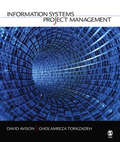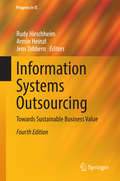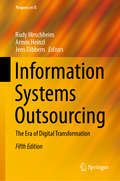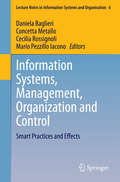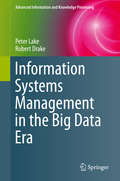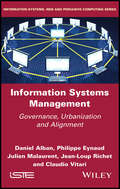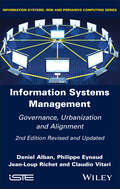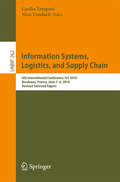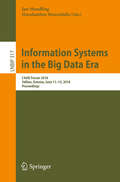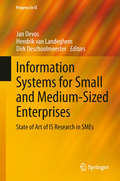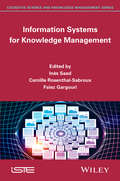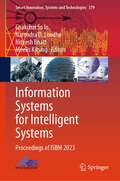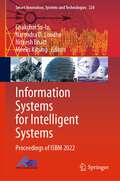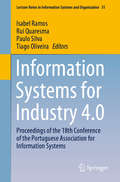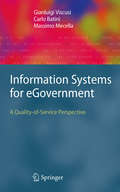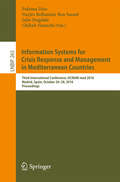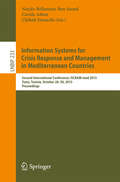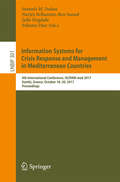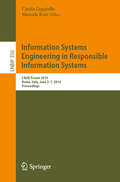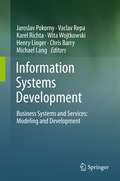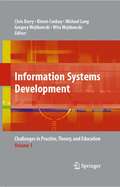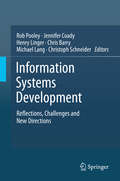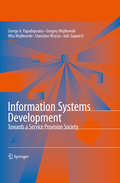- Table View
- List View
Information Systems Project Management
by David E. Avison Gholamreza TorkzadehView IS project management as an art as well as a science. . . . There are a number of books out there on project management. What is different and specific about this book? There is a balance between socio-cultural and technical aspects and there is a balance between qualitative and quantitative aspects – project management is seen as both an art and a science.It provides an information systems orientation for project management: neither information technology oriented on the one side nor production and operations oriented on the other, but of application to both within an organizational-wide view.It stresses information systems as a whole, not just software development – no project is successful if only software aspects are considered.It gives a truly international view of the domain – examples and experiences from different parts of the world add richness as well as context to the material. Globalization has ensured that most projects take on an international dimension.The book provides a coherent explanation of the concerns of the project manager as the project develops through the project life cycle – it does not follow a 'kitchen sink approach'.Each chapter has the following consistent structure: introduction and outline, an exhibit, the main text with examples, chapter summary, exercises, discussion questions, interview with project manager and appendix – this structure provides coherence and consistency.The exhibit, interview and appendix contain real-world examples, experiences, case studies, discussion material, software descriptions and professional codes – these provide material for class discussion and group work. The material has been used on our courses in the United States, Europe and Australia, given to practitioners as well as students (both undergraduate and postgraduate) – it has been well tested as part of our own project managemenThe material in this text has been proven successful through repeated use in courses in the United States, Europe, and Australia, by practitioners as well as undergraduate and postgraduate students.Intended AudienceThis core text is designed for advanced undergraduate and graduate courses such as Management Information Systems, Computer Information Systems, Information Systems, and Decision and Information Systems in the departments of information systems, information technology, and business.
Information Systems Outsourcing
by Rudy Hirschheim Armin Heinzl Jens DibbernThis book attempts to synthesize research that contributes to a better understanding of how to reach sustainable business value through information systems (IS) outsourcing. Important topics in this realm are how IS outsourcing can contribute to innovation, how it can be dynamically governed, how to cope with its increasing complexity through multi-vendor arrangements, how service quality standards can be met, how corporate social responsibility can be upheld and how to cope with increasing demands of internationalization and new sourcing models, such as crowdsourcing and platform-based cooperation. These issues are viewed from either the client or vendor perspective, or both. The book should be of interest to all academics and students in the fields of Information Systems, Management and Organization as well as corporate executives and professionals who seek a more profound analysis and understanding of the underlying factors and mechanisms of outsourcing.
Information Systems Outsourcing: The Era of Digital Transformation (Progress in IS)
by Rudy Hirschheim Armin Heinzl Jens DibbernThis book highlights research that contributes to a better understanding of emerging challenges in information systems (IS) outsourcing. Important topics covered include: how to digitally innovate through IS outsourcing; how to govern outsourced digitalization projects; how to cope with complex multi-vendor and micro-services arrangements; how to manage data sourcing and data partnerships, including issues of cybersecurity; and how to cope with the increasing demands of internationalization and new sourcing models, such as crowdsourcing, cloud sourcing and robotic process automation. These issues are approached from the client’s perspective, vendor’s perspective, or both. Given its scope, the book will be of interest to all researchers and students in the fields of Information Systems, Management, and Organization, as well as corporate executives and professionals seeking a more profound analysis of the underlying factors and mechanisms of outsourcing.
Information Systems, Management, Organization and Control
by Daniela Baglieri Concetta Metallo Cecilia Rossignoli Mario Pezzillo IaconoThis book explores the diversity of topics, views and perspectives focused on the relationship between information systems, organizations and managerial control. It brings together theories and practices by a diverse group of scholars working in different disciplines: organization, management, accounting, information systems development, human-computer interaction. The volume is divided into three sections, each one focusing on a specific theme: organizational change, innovation and information and communication technologies; organizational control, accounting and information systems; information, knowledge and project management practices. The book is based on a selection of the best research papers - original double blind peer reviewed contributions of the annual conference of the Italian chapter of AIS, held in Milan, Italy in December 2013.
Information Systems Management in the Big Data Era
by Peter Lake Robert DrakeThis timely text/reference explores the business and technical issues involved in the management of information systems in the era of big data and beyond. Topics and features: presents review questions and discussion topics in each chapter for classroom group work and individual research assignments; discusses the potential use of a variety of big data tools and techniques in a business environment, explaining how these can fit within an information systems strategy; reviews existing theories and practices in information systems, and explores their continued relevance in the era of big data; describes the key technologies involved in information systems in general and big data in particular, placing these technologies in an historic context; suggests areas for further research in this fast moving domain; equips readers with an understanding of the important aspects of a data scientist's job; provides hands-on experience to further assist in the understanding of the technologies involved.
Information Systems Management: Governance, Urbanization and Alignment
by Daniel Alban Philippe Eynaud Julien Malaurent Jean-Loup Richet Claudio VitariInformation Systems Management is intended to sensitize the heads of organizations to the issues raised by information systems (IS). Through its pedagogical presentation, the book ensures that issues related to IS are not left solely to the experts in the field. The book combines and analyzes three key concepts of IS: governance, urbanization and alignment. While governance requires the implementation of a number of means, bodies and procedures to manage IS more effectively, urbanization involves visualization methods to enable the manager to take into account the different levels of the organization of an IS and their coherence. Finally, alignment assesses the ability of the IS to make a significant contribution to the organization's strategy.
Information Systems Management: Governance, Urbanization and Alignment
by Jean-Loup Richet Daniel Alban Philippe Eynaud Claudio VitariInformation Systems Management is intended to sensitize the heads of organizations to the issues raised by information systems (IS). Through its pedagogical presentation, this book ensures that issues related to IS are not left solely to the experts in the field. This book combines and analyzes three key concepts in IS science: governance, urbanization and alignment. While governance implies the implementation of a certain number of means, bodies and procedures to manage IS more effectively, urbanization involves visualization methods to enable the manager to take into account the different levels of the organization of an IS and their coherence. Finally, alignment assesses the ability of the IS to make a significant contribution to the organization's strategy.
Information Systems, Logistics, and Supply Chain: 6th International Conference, ILS 2016, Bordeaux, France, June 1–4, 2016, Revised Selected Papers (Lecture Notes in Business Information Processing #262)
by Cecilia Temponi Nico VandaeleThis book constitutes revised selected papers from the 6th International Conference on Information Systems, Logistics, and Supply Chains, ILS 2016, held in Bordeaux, France, in June 2016. The conference deals with topics related to supply chain design and management, information and decision-making systems, and innovative practices in logistics. It also encompasses issues such as sustainability, societal impact, uncertainty, and collaboration in supply chain management. The 13 full papers presented were carefully reviewed and selected for inclusion in this volume and reflect the diverse challenges and opportunities experienced in logistics, information and supply chain management. They were organized in topical sections named: transportation and logistics; supply chain planning; collaboration and operations in supply chain; and applications of supply chain topics to business environments (case studies).
Information Systems in the Big Data Era: CAiSE Forum 2018, Tallinn, Estonia, June 11-15, 2018, Proceedings (Lecture Notes in Business Information Processing #317)
by Jan Mendling Haralambos MouratidisThis book constitutes the thoroughly refereed proceedings of the CAiSE Forum 2018 held in Tallinn, Estonia, as part of the 30th International Conference on Advanced Information Systems Engineering, CAiSE 2018, in June 2018. The CAiSE Forum is a place within the CAiSE conference for presenting and discussing new ideas and tools related to information systems engineering. Intended to serve as an interactive platform, the Forum aims at the presentation of emerging new topics and controversial positions, as well as demonstration of innovative systems, tools and applications. This year’s theme was “Information Systems in the Big Data Era”. The 10 full and 12 short papers in this volume were carefully reviewed and selected from 17 direct submissions (of which 2 full and 7 short papers were selected), plus 13 transfers from the CAiSE main conference (which resulted in another 8 full and 5 short papers).
Information Systems for Small and Medium-sized Enterprises
by Jan Devos Hendrik Landeghem Dirk DeschoolmeesterThis book establishes and explores existing and emerging theories on Small and Medium-sized Enterprises (SMEs) and the adoption of IT/IS. It presents the latest empirical research findings in that area of IS research and explores new technologies and practices. The book is written for researchers and professionals working in the field of IS research or the research of SMEs. Moreover, the book will be a reference for researchers, professionals and students in management information systems science and related fields.
Information Systems for Knowledge Management
by Inès Saad Camille Rosenthal-Sabroux Faïez GargouriMore and more organizations are becoming aware of the importance of tacit and explicit knowledge owned by their members which corresponds to their experience and accumulated knowledge about the firm activities. However, considering the large amount of knowledge created and used in the organization, especially with the evolution of information and communications technologies, the firm must first determine the specific knowledge on which it is necessary to focus. Creating activities to enhance identification, preservation, and use of this knowledge is a powerful mean to improve the level of economical performance of the organization. Thus, companies invest on knowledge management programs, in order to develop a knowledge sharing and collaboration culture, to amplify individual and organizational learning, to make easier accessing and transferring knowledge, and to insure knowledge preservation. Several researches can be considered to develop knowledge management programs supported by information and knowledge systems, according to their context, their culture and the stakeholders' viewpoints.
Information Systems for Intelligent Systems: Proceedings of ISBM 2023 (Smart Innovation, Systems and Technologies #379)
by Chakchai So In Narendra D. Londhe Nityesh Bhatt Meelis KitsingThis book includes selected papers presented at the World Conference on Information Systems for Business Management (ISBM 2023), held in Bangkok, Thailand, on September 7–8, 2023. It covers up-to-date cutting-edge research on data science, information systems, infrastructure and computational systems, engineering systems, business information systems, and smart secure systems.
Information Systems for Intelligent Systems: Proceedings of ISBM 2022 (Smart Innovation, Systems and Technologies #324)
by Chakchai So-In Narendra D. Londhe Nityesh Bhatt Meelis KitsingThis book includes selected papers presented at World Conference on Information Systems for Business Management (ISBM 2022), held in Bangkok, Thailand, during September 2–3, 2022. It covers up-to-date cutting-edge research on data science, information systems, infrastructure and computational systems, engineering systems, business information systems, and smart secure systems.
Information Systems for Industry 4.0: Proceedings of the 18th Conference of the Portuguese Association for Information Systems (Lecture Notes in Information Systems and Organisation #31)
by Isabel Ramos Rui Quaresma Paulo Silva Tiago OliveiraThis book provides a selection of the best papers presented at the 18th Conference of the Portuguese Association for Information Systems (CAPSI), which was held in 2018. The focus of the conference and of these proceedings lies on the interplay between information systems and Industry 4.0. All contributions, which include original research, review papers and case studies, were peer-reviewed in a double blind process.
Information Systems for Healthcare Management (Eighth Edition)
by Gerald L. Glandon Detlev H. Smaltz Donna J. SlovenskyThis bestseller provides readers with the comprehensive knowledge necessary to understand healthcare information technology (HIT) and to hone their skills in HIT management. The book explores the areas where leaders must exhibit basic awareness or competency, including hardware, software, and communication systems; operational, management, and clinical applications; and selection, implementation, and valuation. <p><p> Each chapter has been updated to reflect current trends and challenges in the field as well as the implications of the 2010 healthcare reform law and other relevant federal mandates. Each chapter also features learning objectives, web resources, and discussion questions. This revised edition includes a glossary that clarifies technical terms as well as a list of abbreviations for important terms. Links to Internet sources are provided to supplement the information on the major topics covered in each chapter.
Information Systems for eGovernment
by Prof. Carlo Univ. degli Studi di Milano Gianluigi Viscusi Massimo MecellaThe success of public sector investment in eGovernment initiatives strongly depends on effectively exploiting all aspects of ICT systems and infrastructures. The related objectives are hardly reachable without methodological frameworks that provide a holistic perspective and knowledge on the contexts of eGovernment initiatives. Yet public administrators usually have a mix of legal and administrative knowledge, while lacking an information systems background. With this book, Viscusi, Batini and Mecella provide a comprehensive methodology for service-oriented information systems planning, with special emphasis on eGovernment initiatives. They present the eG4M methodology which structurally supports the development of optimal eGovernment plans, considering technological, organizational, legal, economic and social aspects alike. The approach is focused on two pillars: the quality of the provided services and related processes, and the quality of the data managed in the administrative processes and services. The book is written for public administrators, decision-makers, practitioners, ICT professionals and graduate students, providing a comprehensive perspective of the challenges, opportunities and decisions related to strategic and operational planning of service-oriented information systems in eGovernment.
Information Systems for Crisis Response and Management in Mediterranean Countries
by Paloma Díaz Narjès Bellamine Ben Saoud Julie Dugdale Chihab HanachiThis book constitutes the refereed proceedings of the Third International Conference on Information Systems for Crisis Response and Management in Mediterranean Countries, ISCRAM-med 2016, held in Madrid, Spain, in October 2016. Information systems and technologies can play a key role in crisis management in order to support preparation, response, mitigation and recovery processes. Yet technology is not enough to guarantee a better management process, and therefore the conference does not only focus on engineering technologies, but also on their application and practical experiences. The 12 full and 8 short papers presented in this volume were carefully reviewed and selected from 36 submissions. They are organized in topical sections on mobile apps for citizens, modeling and simulation, development of information systems, information and knowledge management, collaboration and coordination, social computing, and issues in humanitarian crisis.
Information Systems for Crisis Response and Management in Mediterranean Countries
by Chihab Hanachi Carole Adam Narjès Bellamine Ben SaoudThis book constitutes the refereed proceedings of the Second International Conference on Information Systems for Crisis Response and Management in Mediterranean Countries, ISCRAMmed 2015, held in Tunis, Tunisia, in October 2015. The objectives of the ISCRAMmed conference are to provide an outstanding opportunity and an international forum for local and international researchers, practitioners, and policy makers to address and discuss new trends and challenges with respect to information systems for crisis response and disaster management. The 14 full papers and 4 short papers presented in this volume were carefully reviewed and selected from 41 submissions. They are organized in topical sections on social computing, modeling and simulation, information and knowledge management, engineering of emergency management systems, and decision support systems and collaboration.
Information Systems for Crisis Response and Management in Mediterranean Countries: 4th International Conference, ISCRAM-med 2017, Xanthi, Greece, October 18-20, 2017, Proceedings (Lecture Notes in Business Information Processing #301)
by Ioannis M. Dokas, Narjès Bellamine-Ben Saoud, Julie Dugdale and Paloma DíazThis book constitutes the refereed proceedings of the 4th International Conference on Information Systems for Crisis Response and Management in Mediterranean Countries, ISCRAM-med 2017, held in Xanthi, Greece, in October 2017. ISCRAM-med conferences aim to enhance the collaboration and solidarity between Mediterranean countries in issues related to crisis management. They offer an outstanding opportunity to address and discuss new trends and challenges in the area of Information systems and Technologies for Crisis Response and Management (ISCRAM). The 12 full and 5 short papers presented in this volume were carefully reviewed and selected from 39 submissions. They were organized in topical sections named: social networking and big data analytics; robotic systems for crisis management; decision making in the context of crisis management; serious games and simulations; and collaboration and information sharing.
Information Systems for Crisis Response and Management in Mediterranean Countries: Third International Conference, ISCRAM-med 2016, Madrid, Spain, October 26-28, 2016, Proceedings (Lecture Notes in Business Information Processing #265)
by Paloma Díaz, Narjès Bellamine Ben Saoud, Julie Dugdale and Chihab HanachiThis book constitutes the refereed proceedings of the Third International Conference on Information Systems for Crisis Response and Management in Mediterranean Countries, ISCRAM-med 2016, held in Madrid, Spain, in October 2016. Information systems and technologies can play a key role in crisis management in order to support preparation, response, mitigation and recovery processes. Yet technology is not enough to guarantee a better management process, and therefore the conference does not only focus on engineering technologies, but also on their application and practical experiences. The 12 full and 8 short papers presented in this volume were carefully reviewed and selected from 36 submissions. They are organized in topical sections on mobile apps for citizens, modeling and simulation, development of information systems, information and knowledge management, collaboration and coordination, social computing, and issues in humanitarian crisis.
Information Systems Engineering in Responsible Information Systems: CAiSE Forum 2019, Rome, Italy, June 3–7, 2019, Proceedings (Lecture Notes in Business Information Processing #350)
by Cinzia Cappiello Marcela RuizThis book constitutes the thoroughly refereed proceedings of the CAiSE Forum 2019 held in Rome, Italy, as part of the 31st International Conference on Advanced Information Systems Engineering, CAiSE 2019, in June 2019.The CAiSE Forum - one of the traditional tracks of the CAiSE conference - aims to present emerging new topics and controversial positions, as well as demonstration of innovative systems, tools and applications related to information systems engineering. This year’s theme was “Responsible Information Systems”. The 19 full papers and 3 short papers presented in this volume were carefully reviewed and selected from 14 direct submissions (of which 7 full papers were selected), plus 15 transfers from the CAiSE main conference (which resulted in another 12 full and 3 short papers).
Information Systems Development: Modeling and Development
by Michael Lang Chris Barry Wita Wojtkowski Henry Linger Vaclav Repa Karel Richta Jaroslav PokornyInformation Systems Development: Business Systems and Services: Modeling and Development, is the collected proceedings of the 19th International Conference on Information Systems Development held in Prague, Czech Republic, August 25 - 27, 2010. It follows in the tradition of previous conferences in the series in exploring the connections between industry, research and education. These proceedings represent ongoing reflections within the academic community on established information systems topics and emerging concepts, approaches and ideas. It is hoped that the papers herein contribute towards disseminating research and improving practice.
Information Systems Development: Challenges in Practice, Theory, and Education Volume 1
by Michael Lang Kieran Conboy Chris Barry Gregory Wojtkowski Wita WojtkowskiInformation Systems Development (ISD) progresses rapidly, continually creating new challenges for the professionals involved. New concepts, approaches and techniques of systems development emerge constantly in this field. Progress in ISD comes from research as well as from practice. This conference will discuss issues pertaining to information systems development (ISD) in the inter-networked digital economy. Participants will include researchers, both experienced and novice, from industry and academia, as well as students and practitioners. Themes will include methods and approaches for ISD; ISD education; philosophical, ethical, and sociological aspects of ISD; as well as specialized tracks such as: distributed software development, ISD and knowledge management, ISD and electronic business / electronic government, ISD in public sector organizations, IOS.
Information Systems Development: Reflections, Challenges and New Directions
by Rob Pooley Jennifer Coady Henry Linger Chris Barry Michael Lang Christoph SchneiderInformation Systems Development: Reflections, Challenges and New Directions, is the collected proceedings of the 20th International Conference on Information Systems Development held in Edinburgh, Scotland, August 24 - 26, 2011. It follows in the tradition of previous conferences in the series in exploring the connections between industry, research and education. These proceedings represent ongoing reflections within the academic community on established information systems topics and emerging concepts, approaches and ideas. It is hoped that the papers herein contribute towards disseminating research and improving practice
Information Systems Development: Towards a Service Provision Society
by Gregory Wojtkowski Wita Wojtkowski Stanislaw Wrycza Jože Zupancic George Angelos PapadopoulosThis volume of Information System Development, Towards a Service Provision Society is the published proceedings of the 17th International Conference on Information Systems Development (ISD2008) that was hosted by the Department of Computer Science of the University of Cyprus at the Annabelle Hotel, Paphos, Cyprus from August 25-27, 2008. The theme of the conference was "Towards a Service Provision Society". In total, 131 delegates from 34 different countries registered for the conference, making it a truly international event. Papers presented at the conference strongly reflected the conference theme. Of 165 papers submitted, 99 were presented at the conference, representing an acceptance rate of approximately 60%. All papers were peer reviewed by three or four referees (a total of 543 review reports were submitted, corresponding to an average of 3.29 reviews per paper). Over the course of three days, 28 paper sessions were held, covering a range of areas such as: "Information Systems Engineering & Management", "Business Systems Analysis & Design", "Intelligent Information Systems", "Agile and High-Speed Systems Development Methods", "Enterprise Systems Development & Adoption", "Public Information Systems Development", "Information Systems Development Education", "Information Systems Development in Developing Nations", "Legal and Administrative Aspects of Information Systems Development", "Information Systems Research Methodologies", "Service-Oriented Analysis and Design of Information Systems", "IT Service Management", "Philosophical and Theoretical Issues in Information Systems Development", "Model-driven Engineering in ISD", "Human Computer Interaction (HCI) in Information Systems Development". The book is organised by order of the conference sessions. While all the presented papers were of high quality, we have selected two of them to share the Best Paper Award. The first one is: "Modeling the contribution of enterprise architecture practice to the achievement of business goals" by Marlies van Steenbergen & Sjaak Brinkkemper. The second one is: "Why can't we bet on ISD Outcomes?: ISD "Form" as a Predictor of Success" by Mike Newman, Shan L Pan & Gary Pan. Furthermore, to acknowledge the quality of the reviews he completed, the quality of the paper he submitted, his role as a track and session chair, and his general participation in the conference, we have awarded an Ovreall Contribution Award to Michael Lang of the National University of Ireland, Galway. Details of these awards can be found on the conference Web site at http://isd2008.cs.ucy.ac.cy. Our gratitude is extended firstly to all those who attended and authored work for the conference. The contribution of the International Program Committee was invaluable in identifying track chairs and reviewers to commit to doing vital work. While volunteering to host a conference is a highly personal undertaking, without support it would be impossible. Thus, we wish to thank our sponsors for their financial support and other aid. The ISD conference community has developed over the years a real sense of collegiality and friendliness, perhaps unusually so for a conference. At the same time it has been a stimulating forum where a free exchange of views and perspectives is encouraged. Perhaps what brings the community together is a belief that the process of systems development is important; whether it is systematic or structured or improvised or spontaneous, there is something about the process and the outcomes that excites us. We form a spectrum of thought from those who see the activity as somewhat scientific to others that see it as wholly sociological; we span a divide between abstract and conceptual, to hard code and artefacts - somewhere in-between lies the truth. If our work is to make a meaningful contribution to both practice (by teaching students) and research (by sharing our experiences and studies with others), then hopefully this conference will have done a little of the former and much for the latter.
